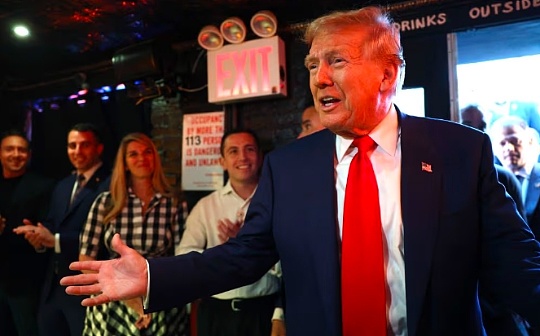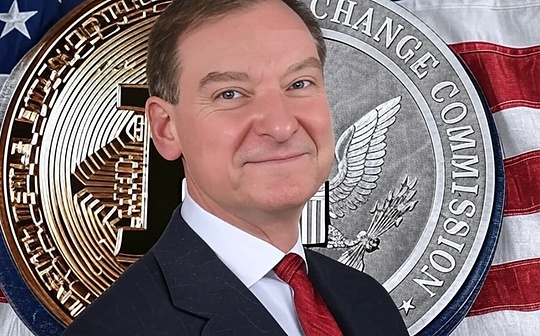
Source: CoinDesk; Compilation: Baishui, bitchain vision
Preface
More than 20 lawyers working in the cryptocurrency industry have written an open letter outlining how the incoming Trump administration has created a legal environment conducive to the development of cryptocurrencies.The letter, exclusively published by CoinDesk, covers the regulation of the SEC and CFTC, the potential legislation governing stablecoins and DeFi, as well as tax cuts and simplifications.
The following is the original text of the letter:
Dear President-elect Trump:
Last year, you gave a keynote speech at the Bitcoin conference in Nashville, promising that if re-election would make the United States the world’s cryptocurrency capital.As you return to the President’s Office this Monday, we write to you as a practicing member of the Cryptocurrency Lawyers Association to recommend regulatory policies that will help you achieve this.
Like cryptocurrencies, the United States is based on personal freedom and naturally leads the world’s development.Unfortunately, U.S. regulators still refuse to apply existing laws to digital assets and the blockchain behind them (even refuse to explain why), and create an unfavorable business environment that forces many entrepreneurs and developers to travel overseas.
To unleash American creativity and make up for the neglect of the blockchain industry, we recommend that you implement the following forward-looking policies in three areas: support American companies; promote crypto values such as privacy, de-mediation and decentralization;Create a good business environment.
Support American businesses
The cryptocurrency industry has generated a range of mature and emerging use cases, including digital gold, stablecoins, license-free payments, decentralized finance, real-world assets, decentralized physical infrastructure (DePIN), and more.Many of these use cases are being responsibly advanced in the U.S. by companies such as Coinbase, Circle, and Consensys, as well as developers who contribute to the open source decentralized infrastructure of cryptocurrencies.To continue to compete with international competitors, these parties need clear rules and appropriate regulatory guidance.
General Rules
Token issuance and secondary market sales are at the heart of the crypto economy, confusing and overlapping regulatory authority by the Securities and Exchange Commission (SEC) and Commodity Futures Trading Commission (CFTC).Market structure legislation should clearly define the jurisdiction of the main regulatory bodies and specify when assets enter and exit the jurisdiction.
In this regard, Congress should avoid making the U.S. securities law too wide, like the SEC.Tokens driven by open source software and consensus mechanisms have the lowest dependence on centralized participants in other ways and are therefore not securities, because there is no legal relationship defined by securities laws between the token owner and the “issuer”.Similarly, crypto assets such as art NFTs (just digital artworks) and non-investment activities such as pledges and lending Bitcoins) are not subject to the jurisdiction of the Securities Act.
Congress should be bolder.This means not to be bound by previous legislative efforts such as FIT21, which were formed in an early political environment with unexpected consequences.This also means leveraging regulatory experiences in other countries, such as the EU’s MiCA framework, while avoiding their pitfalls, and planning a unique and fearless path forward for the United States.
Specific industries
In addition to advocating general rules, your administration should also urge Congress and relevant agencies to address specific areas of issues as they are strategically important to the crypto industry and the country.
Stablecoin.The current market value of stablecoins exceeds US$200 billion, which is the lifeblood of the digital asset ecosystem.Their increasing recognition in frameworks such as stablecoin standards and national regulators requires comprehensive legislation on their issuance and management to ensure they are transparently supported and do not threaten financial stability.In addition to benefiting consumers, regulatory support for stablecoins also promotes national interests.Similar to the Euro dollar, stablecoins, usually denominated in US dollars, consolidate the dollar’s position as a global reserve currency and increase demand for U.S. Treasury bonds held by issuers.
TradFi integration.The unprecedented success of Bitcoin and Ethereum ETFs shows that cryptocurrencies have begun to merge with traditional finance.Regulatory policies should ensure safe and orderly integration so that consumers can access credible hosting services.This requires the modification or repeal of biased SEC accounting standards (such as SAB 121) and custody rules.But we should not stop there.The supportive innovation policy in this area should also promote the tokenization of securities representing traditional financial assets such as stocks, bonds or real estate into blockchain-based tokens.The resulting benefits include increased liquidity, partial ownership and faster settlements, which will strengthen the U.S. capital market and ensure it remains the most developed and innovative market in the world.
DeFi.Decentralized finance has the potential to modernize the global financial system and bring value to ordinary Americans by eliminating expensive financial intermediaries.You shouldn’t let vested interests and alarmist words stop the United States from becoming a world leader in DeFi.In this regard, regulation targeting centralized players such as exchanges and issuers must be formulated in a way that avoids unintentional capture and paralysis of the DeFi ecosystem that is still in its infancy.
Promote innovation through commitment to crypto value
If cryptocurrency innovation is to be promoted, regulatory policies must respect the value of cryptocurrencies, including privacy, non-mediation and decentralization.This commitment produces two key regulatory principles.First, in the presence of traditional analogs, regulation should not put a greater burden on cryptocurrencies.Second, regulation should continue to evolve in the absence of traditional analogues.
When to treat cryptocurrencies as equals to traditional assets and tools
The first principle affects products such as self-hosted wallets that enable users to hold and manage their own private keys.Since these tools are similar to physical wallets used for personal asset management, they should not be considered anything different—that is, as financial intermediaries for regulatory oversight and monitoring purposes.You don’t need to complete KYC to deposit cash into a physical wallet; the same should be true for storing tokens in a digital wallet.
A similar logic applies to taxing block rewards.Americans who mine or verify blockchain transactions are creating new properties, just like farmers growing crops in the fields.However, the IRS is currently taxing their income.This differential treatment should be abolished.
When should cryptocurrencies be treated differently
The second principle requires regulators to resist placing cryptocurrency participants and activities in a legacy framework that is incompatible with cryptocurrencies.Doing so will undermine the cryptocurrency ecosystem, push the industry overseas, and erode the rule of law.
Unfortunately, this is the path many U.S. regulators have chosen.
The IRS has begun to view the cryptocurrency front-end as a “broker” without legal authority.The Justice Department has begun accusing uncustodial wallet developers of violating unlicensed fund transfer rules, although its long-standing policy is exactly the opposite.The U.S. Treasury Department has approved a smart contract for the privacy mixer Tornado Cash, although it is neither a foreigner nor a property, but just code.(The Court of Appeal overturned the sanction.)
Without reducing the importance of government interests (tax evasion, money laundering and national security), we believe that the government’s practices in each case are wrong in terms of innovative policies, and we encourage your government to reverse them.
We urge regulators not to regulate digital assets and blockchain businesses like traditional companies, but to work with this new technology model and our industry.For example, if in some cases government monitoring (KYC) in a decentralized environment is actually justified, regulators can leverage cross-protocol portable blockchain-based credentials to give users control over their data (Advantages of Web3 architecture) and aligned with the frictionless blockchain ecosystem.Likewise, they can integrate the programmability of tokens and smart contracts, excluding sanctioned parties from the crypto economy.
Attract top talents through a good business environment
To be the preferred destination for top crypto talents, the United States must create a good business environment.Your government can start this process on day one.
End the debanking of crypto companies.Your administration should direct Federal Deposit Insurance Corporation (FDIC) and all other institutions involved in Operation Chokepoint 2.0 to immediately stop irresponsible activities designed to debank the crypto industry.
Improve SEC rulemaking and enforcement.You should instruct your SEC Chairman to overhaul the agency’s attitude towards encryption.Over the past four years, the SEC has exceeded its authority, holding the integrity industry leaders such as Coinbase and Consensys accountable, regulating individual developers and users (in its exchange redefining rules) and taking enforcement actions against wallet providers.It is time for the SEC to correct this harmful practice and start constructive engagement with the crypto industry while focusing on preventing fraud rather than curbing financial speculation, which is beneficial to innovation.
Removal of punitive tax rules.Your government should remove punitive tax rules that push entrepreneurs and developers overseas while leaving well-intentioned taxpayers uncertain about how to calculate their tax bills.At-a-reach improvements include current fees for adopting software development; tax extensions for validation rewards and airdrops; safe harbors for minimum consumption transactions (such as less than $5,000); market-based options for cryptocurrency investors and the abolition of treating the website as a brokerIRS reporting regulations.Congress should also repeal the amendment to Section 6050I, which imposes heavy (and possibly unconstitutional) reporting requirements on cryptocurrency transactions of more than $10,000.
Reduce unnecessary red tape.Along with the mission of the Department of Government Efficiency (D.O.G.E.), we urge your office to work with Congress and government agencies to reduce unnecessary red tape that limits cryptocurrencies and fintech.This includes simplifying or canceling registration and reporting requirements for digital asset issuances that meet certain criteria, including providing necessary investor disclosures.Congress should also consider legislation to develop a unified federal currency transfer licensing framework that brings clarity and efficiency to the broader fintech ecosystem.
In implementing the forward-looking policies mentioned above, we encourage your government to consult with industry leaders and be sensitive to the transnational scope of the digital asset ecosystem.(We believe that your establishment of a cryptocurrency committee is a positive step in this direction.) We also recommend using equipment such as regulatory sandboxes to limit the risk of unexpected regulatory consequences.
Now is a good time for the United States to begin establishing its global regulatory leadership.By ensuring that you do so, your administration will contribute to the country’s future economic prosperity and support a technology based on the deeply rooted values and freedoms of the United States.You should seize the opportunity.
Sincerely,
Ivo Entchev, Olta Andoni, Stephen Rutenberg, Donna Redel
The following members of the Crypto Lawyers Association also signed the letter: Mike Bacina, Joe Carlasare, Eli Cohen, Mike Frisch, Jason Gottlieb, Eric Hess, Katherine Kirkpatrick, Dan McAvoy, John McCarthy, Margaret Rosenfeld, Gabriel Shapiro, Ben Snipes,Noah Spaulding, Andrea Tinianow, Jenny Vatrenko, Collin Woodward and Rafael Yakobi.







